External links
 | This biographical article related to association football in Indonesia, about a forward, is a stub. You can help Wikipedia by expanding it. |
| Personal information | |||
|---|---|---|---|
| Full name | Jaya Teguh Angga Warsito | ||
| Date of birth | 14 August 1987 | ||
| Place of birth | Malang, Indonesia | ||
| Height | 1.78 m (5 ft 10 in) | ||
| Position(s) | Striker | ||
| Youth career | |||
| Persema Malang | |||
| Senior career* | |||
| Years | Team | Apps | (Gls) |
| 2007–2011 | Persema Malang | 56 | (29) |
| 2011–2013 | Arema Cronus F.C. | 31 | (3) |
| 2014–2016 | Pusamania Borneo F.C. | 29 | (7) |
| 2017–2019 | PSBI Blitar | 27 | (11) |
| International career | |||
| 2010 | Indonesia | 1 | (0) |
| *Club domestic league appearances and goals | |||
Jaya Teguh Angga Warsito (born 14 August 1987) is an Indonesian former footballer who currently plays as a striker and also former member of Indonesia national team.

Indonesia, officially the Republic of Indonesia, is a country in Southeast Asia and Oceania, between the Indian and Pacific oceans. It consists of over 17,000 islands, including Sumatra, Java, Sulawesi, and parts of Borneo and New Guinea. Indonesia is the world's largest archipelagic state and the 14th-largest country by area, at 1,904,569 square kilometres. With over 280 million people, Indonesia is the world's fourth-most-populous country and the most populous Muslim-majority country. Java, the world's most populous island, is home to more than half of the country's population.
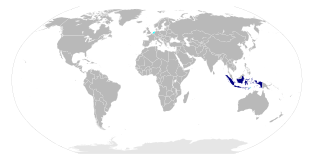
Indonesian is the official and national language of Indonesia. It is a standardized variety of Malay, an Austronesian language that has been used as a lingua franca in the multilingual Indonesian archipelago for centuries. With over 280 million inhabitants, Indonesia ranks as the fourth most populous nation globally. According to the 2020 census, over 97% of Indonesians are fluent in Indonesian, making it the largest language by number of speakers in Southeast Asia and one of the most widely spoken languages in the world. Indonesian vocabulary has been influenced by various regional languages such as Javanese, Sundanese, Minangkabau, Balinese, Banjarese, and Buginese, as well as by foreign languages such as Arabic, Dutch, Portuguese, and English. Many borrowed words have been adapted to fit the phonetic and grammatical rules of Indonesian, enriching the language and reflecting Indonesia's diverse linguistic heritage.
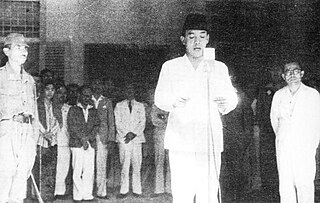
The Indonesian National Revolution, also known as the Indonesian War of Independence, was an armed conflict and diplomatic struggle between the Republic of Indonesia and the Dutch Empire and an internal social revolution during postwar and postcolonial Indonesia. It took place between Indonesia's declaration of independence in 1945 and the Netherlands' transfer of sovereignty over the Dutch East Indies to the Republic of the United States of Indonesia at the end of 1949.

The national flag of Indonesia is a simple bicolor with two horizontal bands, red (top) and white (bottom) with an overall ratio of 2:3. It was introduced and hoisted in public during the proclamation of independence on 17 August 1945 at 56 Proklamasi Street in Jakarta, and again when the Dutch formally transferred sovereignty on 27 December 1949. The design of the flag has remained unchanged since.

Jemaah Islamiyah was a Southeast Asian Islamist militant group based in Indonesia, which was dedicated to the establishment of an Islamic state in Southeast Asia. On 25 October 2002, immediately following the JI-perpetrated 2002 Bali bombings, JI was added to the UN Security Council Resolution 1267.

Sukarno was an Indonesian statesman, orator, revolutionary, and nationalist who was the first president of Indonesia, serving from 1945 to 1967.

Bacharuddin Jusuf Habibie was an Indonesian politician, engineer and scientist who served as the third president of Indonesia from 1998 to 1999. Less than three months after his inauguration as the seventh vice president in March 1998, he succeeded Suharto, who resigned after 32 years in office, thereby being the only Vice President to assume the presidency in such a manner. Originating from Sulawesi with Bugis-Gorontalese and Javanese ancestry, his presidency was seen as a landmark and transition to the Reform era.

The Bandung Institute of Technology is a national research university located in Bandung, Indonesia. It has produced many notable leaders in science, engineering, politics, business, academia, and culture. ITB is generally considered one of the most prestigious universities in Indonesia with the nickname "Top 2", along with the University of Indonesia.
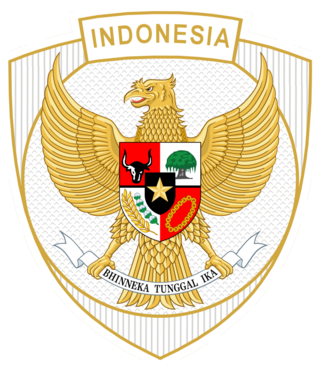
The Indonesia national football team represents Indonesia in international men's football matches since 1945. The men's national team is controlled by the Football Association of Indonesia (PSSI), the governing body for football in Indonesia, which is a part of AFC, under the jurisdiction of FIFA. Most of Indonesia home matches are played at the Gelora Bung Karno Stadium.

Gadjah Mada University is a public research university located in Sleman, Special Region of Yogyakarta, Indonesia. Officially founded on 19 December 1949, Gadjah Mada University is one of the oldest and largest institutions of higher education in the country, and has been credited as one of the best universities in Indonesia. In the 2024 QS World University Rankings, UGM is ranked 2nd in Indonesia and 263rd in the world.

The Indonesian Army is the land branch of the Indonesian National Armed Forces. It has an estimated strength of 300,400 active personnel. The history of the Indonesian Army has its roots in 1945 when the Tentara Keamanan Rakyat (TKR) "People's Security Army" first emerged as a paramilitary and police corps.

The Football Association of Indonesia is the governing body of football in Indonesia. It was founded on 19 April 1930. The PSSI joined FIFA in 1952 and the Asian Football Confederation in 1954.
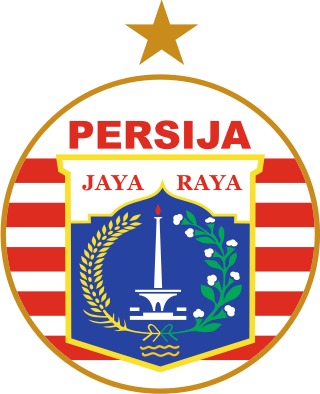
Persatuan Sepakbola Indonesia Jakarta, abbreviated as Persija, is an Indonesian professional football club based in the Indonesian capital city of Jakarta. Persija Jakarta is one of the most successful football clubs in Indonesia with 2 Indonesian League titles and 9 Perserikatan titles. It has never been in a lower league since a nationwide competition started in 1930, fifteen years before Indonesia became an independent country. Persija is one of the founders of the Indonesian football association PSSI, along with six other clubs. Persija's rivalry with fellow PSSI founder Persib Bandung has gone on for decades, occasionally marred by violence.
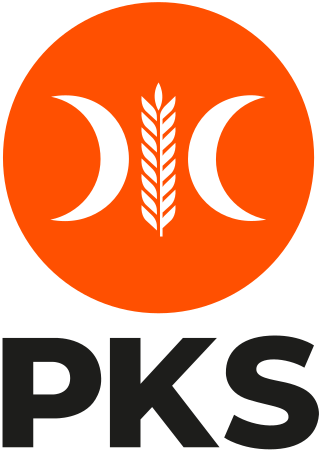
The Prosperous Justice Party, frequently abbreviated to PKS, is an Islamist political party in Indonesia.

Persatuan Sepakbola Indonesia Bandung, commonly referred to as simply Persib, is an Indonesian professional football club based in Bandung, West Java. The club competes in the Liga 1, the top tier of Indonesian football. Founded in 1919 as Bandoeng Inlandsche Voetbal Bond (BIVB), it officially changed to its current name in 1933. The team is also known by its nicknames Pangeran Biru and Maung Bandung. Their home stadium is Gelora Bandung Lautan Api, which has a capacity of 38,000.

PT Indosiar Visual Mandiri, commonly known as Indosiar, is an Indonesian over-the-air television broadcaster, established on 19 July 1991, with test broadcasts commencing on 18 December 1994, and officially launching on 11 January 1995. It has been owned by Emtek since 2011 and later operated under its subsidiary, Surya Citra Media since May 2013, with the network's original owner, Indosiar Karya Media, absorbed into SCM.

The Japanese Empire occupied the Dutch East Indies during World War II from March 1942 until after the end of the war in September 1945.

The president of the Republic of Indonesia is the head of state and head of government of the Republic of Indonesia. The president is the leader of the executive branch of the Indonesian government and the supreme commander of the Indonesian National Armed Forces and the Indonesian National Police. Since 2004, the president and vice president have been directly elected to a five-year term, once renewable, allowing for a maximum of 10 years in office. The new president of Indonesia is Prabowo Subianto, who assumed office on 20 October 2024.
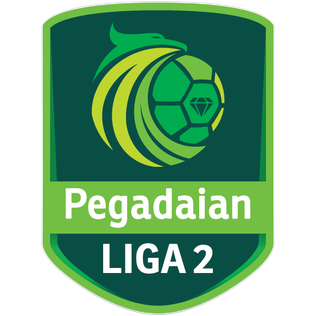
Liga 2, known as Pegadaian Liga 2 for sponsorship reasons with Pegadaian, is the second-tier of the football competition system in Indonesia, organized by Football Association of Indonesia (PSSI). The competition started in 2017 after PSSI changed the previous competition Liga Indonesia Premier Division.

Joko Widodo, popularly known as Jokowi, is an Indonesian politician and businessman who served as the seventh president of Indonesia from 2014 to 2024. Previously a member of the Indonesian Democratic Party of Struggle (PDI-P), he was the country's first president to not emerge from the country's political or military elite. He previously served as governor of Jakarta from 2012 to 2014 and mayor of Surakarta from 2005 to 2012.